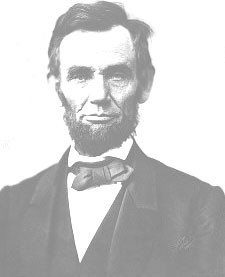People
Statesmen
Abraham Lincoln (1809-1865)
Abraham Lincoln (1809-1865) [Nine U.S. Presidents]. Was the 16th (1861-1865) President of the United States, and the first President from the Republican Party.
Lincoln is widely regarded as one of the best Presidents in US History, both by historians and the American public. He is often praised for successfully restoring the federal unity of the nation by defeating the secessionist Confederate States of America in the U.S. Civil War and, along the way, playing an important role in ending chattel slavery in the United States.
However, a number of states' rights supporters (especially those sympathetic to the cause of the Confederacy) continue to view Lincoln as a tyrant who suspended civil liberties and secrecy of the ballot, had anti-war protesters - including women and children - executed, and suppressed the legitimate right to secede for which Lincoln himself had argued in 1848. Other critics emphasize Lincoln's white-supremacist beliefs (Lincoln-Douglas Debates of 1858) and early support for slavery.
He showed tremendous leadership to the Union populace during the war as evidenced by the Gettysburg Address, a speech dedicating a cemetery of Union soldiers from the Battle of Gettysburg in 1863. While most of the speakers - e.g. Edward Everett - at the event spoke at length, some for hours, Lincoln's few choice words resonated across the nation and across history, defying Lincoln's own prediction that "The world will little note, nor long remember what we say here." While there is little documentation of the other speeches of the day, Lincoln's address is regarded as one of the great speeches in history.
Without General Grant and his wife, or his bodyguard Ward Hill Lamon, to whom he related his famous dream of his own assassination, the Lincolns left to attend a play at Ford's Theater. The play was "Our American Cousin", a musical comedy by the British writer Tom Taylor (1817-1880). As Lincoln sat in the balcony, John Wilkes Booth, an actor and Southern sympathizer from Virginia, crept up behind Lincoln in his State Box and aimed a single-shot, round-slug .44 caliber derringer at the President's head, firing at point-blank range. He shouted "Sic semper tyrannis!" (Latin: "Thus always to tyrants," and Virginia's state motto; some versions say he said "The south is avenged!") and jumped from the balcony to the stage below, breaking his leg in the fall.
The conspirators had planned to kill a number of other government officials at the same time, but for various reasons Lincoln's was the only assassination actually carried out. Booth managed to limp to his horse and escape, and the mortally wounded president was taken to a house across the street, now called the Petersen House, where he lay in a coma for some time before he quietly expired. Abraham Lincoln was officially pronounced dead at 7:21 AM, on April 15th, 1865 [Lincoln-Kennedy].
Booth and several of his companions were eventually captured and either hanged or imprisoned. Booth himself was shot when discovered holed up in a barn. Four people were tried by military tribunal and hanged for the assassination (David Herold, George Atzerodt, Lewis Powell (aka Lewis Payne), and Mary Surratt, the first woman ever executed in the United States.) Three people were sentenced to life imprisonment (Michael O'Laughlin, Samuel Arnold, and Samuel Mudd). Edman Spangler was sentenced to six years imprisonment. John Surratt, tried later by a civilian court, was acquitted. The fairness of the convictions, particularly of Mary Surratt, have been called into question, and there are doubts as to the exact degree of her involvement, if any, in the conspiracy.
Abraham Lincoln (1809-1865)

04-22-2004